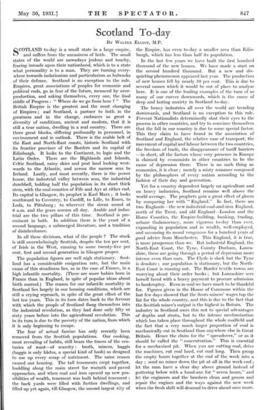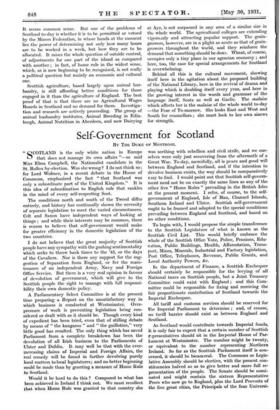Scotland To-day
BY WALTER ELLIOT,
M.P.
SCOTLAND to-day is a small state in a large empire, and suffers from the uneasiness of both. The small states of the world are nowadays jealous and touchy, fearing inroads upon their nationhood, which is to a state what personality is to a man. They are turning every- where towards isolationism and particularism as bulwarks of their defence. Scotland is no exception to the rule. Empires, great associations of peoples for economic and political ends, go in fear of the future, menaced by over- production, and asking themselves, every one, the final riddle of Progress : " Where do we go from here ? " The British Empire is the greatest and the most changing of Empires ; and Scotland, a partner to both in the greatness and in the change, embraces so great a diversity of conditions, ancient and modern, that it is still a true nation, dwelling in a real country. There are three great blocks, differing profoundly in personnel, in environment and in outlook. There is the arable belt of the East and North-East coasts, historic Scotland with its frontier province of the Borders and its capital of Edinburgh. It looks to the Continent, to logic and the Latin Order. There are the Highlands and Islands, Celtic Scotland, rainy skies and peat land looking west- wards to the Atlantic, and across the narrow seas to Ireland. Lastly, and most recently, there is the power house, the industrial valley between seas, the industrial dumbbell, holding half the population in its short thick stem, with the coal counties of Fife and Ayr at either end. Its capital is Glasgow, its prophet is Karl Marx ; it looks southward to Coventry, to Cardiff, to Lille, to Essen, to Lodz, to Pittsburg ; to wherever the sirens sound at 6 a.m. and the gears 'scream all day. Arable and indus- trial are the two pillars of this time. Scotland is pre- eminent in both. In addition there is the yeast of a second language, a submerged literature, and a tradition of disinheritance.
In all these divisions, what of the people ? The stock is still overwhelmingly Scottish, despite the ten per cent. of Irish in the West, running to some twenty-five per cent. first and second generation in Glasgow proper.
The population figures are well nigh stationary. Scot- land has a considerable emigration rate, but the main cause of this steadiness lies, as in the case of France, in a high infantile mortality. (There are more babies born in France than in England, in spite of popular ideas about birth control.) The reason for our infantile mortality in Scotland lies largely in our housing conditions, which are still a crying reproach, in spite of the great effort of the last ten years. This in its turn dates back to the fervour with which the people of Scotland flung themselves into the industrial revolution, as they had done only fifty or sixty years before into the agricultural revolution. This in its turn is due to the poverty of the nation, from which it is only beginning to escape.
The fear of actual famine has only recently been removed from the Scottish populations. Our cooking, most revealing of habits, still bears the traces of the cen- turies of want—of scarcity : broth, minces, haggis (haggis is only hidus, a special kind of hash) so designed to use up every scrap of nutriment. The same reason caused our housing. The tall tenements crept together, huddling along the main street for warmth and paved approaches, and when coal and iron opened up new pos- sibilities of wealth, tenement was built behind tenement ; the back yards were filled with further dwellings, and filled up yet again, till Glasgow, the second largest eity of the Empire, has even to-day a smaller area than Edin- burgh, which has less than half its population.
In the last few years we have built the first hundred thousand of the new houses. We have made a start on the second hundred thousand. But a new and dis- quieting phenomenon appeared last year. The production of new houses fell by nearly 50 per cent. This is due to several causes which it would be out of place to analyse here. It is one of the leading examples of the turn of so many of our curves downwards, which is the cause of deep and lasting anxiety in Scotland to-day.
The heavy industries all over the world are trending downwards, and Scotland is no exception to this rule. Fervent Nationalists determinedly shut their eyes to the process in other countries, and try to convince themselves that the fall in our country is due to some special factor. This they claim to have found in the association of Scotland and England, the relative ease of transport, the movement of capital and labour between the two countries, the freedom of trade, the disappearance of tariff barriers —in short, all the factors whose very presence in Europe is claimed by economists in other countries to be the cause of depression there. There is no such thing as economics, it is clear ; merely a misty romance composed by the philosophers of every nation according to the fashion of their day and generation.
Yet for a country dependent largely on agriculture and on heavy industries, Scotland remains well above the world average. The prophets gain a great effect of gloom by comparing her with " England." In fact, there are two Englands—the new industrial coal-and-iron England, north of the Trent, and old England—London and the Home Counties, the Empire-building, banking, trading, urbane thalassocracy, more vigorous to-day than ever, expanding in population and in wealth, well-employed, and savouring its moral vengeance for a hundred years of good advice from Manchester. This England, it is true, is more prosperous than we. But industrial England, the North-East Coast, the Tyne, County Durham, Lanca- shire, these arc going through a period of depression more intense even than ours. The Clyde is slack but the Tyne is desolate ; our population is stationary, but the North- East Coast is running out. The Border textile towns are worrying about their order books ; but Lancashire sees herself faced with a heavy payment to procure admission to bankruptcy. Even in coal we have much to be thankful for. Figures given in the House of Commons within the last few days showed that the Scots miners' wages top the list for the whole country, and this is due to the fact that the Scottish miner's output is the highest in Britain. The industry in Scotland owes this not to special advantages of depths and strata, but to the intense mechanization which has taken place throughout the whole coalfield and the fact that a very much larger proportion of coal is mechanically cut in Scotland than anywhere else in Great Britain. Hence the claim for the " spreadover," or as it should be called the " concentration." This is essential for a mechanized pit. When you are cutting coal, drive the machines, cut coal hard, cut coal long. Then group the empty hours together at the end of the week into a day ; send no miner down the pit at all in the week-end ; let the man have a clear day above ground instead of pottering below with a hand-axe for " seven hours," and let the engineers and the brushers clean and groom and repair the engines and the ways against the new week when the fresh shift will descend to drive ahead once more. It seems common sense. But one of the problems of Scotland to-day is whether it is to be permitted or vetoed by the Miners Federation, in whose hands at the moment lies the power of determining not only how many hours are to be worked in a week, but how they are to be allocated. It raises the whole question of outside control, of adjustments for one part of the island as compared with another ; in fact, of home rule in the widest sense, which, as is now beginning to be recognized, is not really a political question but mainly an economic and cultural one.
Scottish agriculture, based largely upon animal hus- bandry, is still affording better conditions for those engaged in it than the agriculture of England. The best proof of that is that there are no Agricultural Wages Boards in Scotland and no demand for them. Investiga- tion and research are actively proceeding. The group of animal husbandry institutes, Animal Breeding in Edin- burgh, Animal Nutrition in Aberdeen, and now Dairying at Ayr, is not surpassed in any area of a similar size in thv whole world. The agricultural colleges are extending vigorously and attracting popular support. The grain- growers, however, are in a plight as acute as that of grain- growers throughout the world, and they reinforce the demand that something should be done. Wheat, of course, occupies only a tiny place in our agrarian economy ; and here, too, the case for special arrangements for Scotland is overwhelming.
Behind all this is the cultural movement, showing itself here in the agitation about the proposed building of the National Library, here in the revival of drama and playing which is doubling itself every year, and here in the growing interest in the words and grammar of the language itself, Scots as well as Gaelic. The malaise which affects her is the malaise of the whole world to-day —the Fear of To-morrow. She looks East and West and South for counsellors ; she must look to her own sinews for strength.







































 Previous page
Previous page